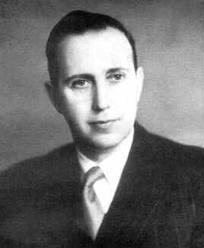Arthur Geoffrey Walker
Arthur Geoffrey Walker ( born July 17, 1909 in Watford, Hertfordshire, England; † 31 March 2001) was a British mathematician who worked on differential geometry and has provided significant amounts to cosmology.
Walker studied from 1931 at the University of Oxford, most recently under the influence of Edward Arthur Milne. He received his PhD in Edinburgh, where he was tested by Arthur Eddington, and was then a post-doc at Imperial College in London. In 1936 he became a lecturer at the University of Liverpool and from 1947 professor at the University of Sheffield. In 1952 he was again professor in Liverpool, where he retired in 1974.
In 1955 he became a member of the Royal Society, and he was also a member of the Royal Society of Edinburgh, their Keith Medal he received in 1950. In 1947 he was awarded the Junior Berwick Prize of the London Mathematical Society.
Walker was a trained surveyor, but he is better known today for his contributions to general relativity. Together with Alexander Alexandrovich Friedmann, Georges Lemaître and Howard Percy Robertson, he developed the well-known Friedmann - Lemaître - Robertson - Walker metric, which represents an exact solution of Einstein's field equations of general relativity. Robertson and Walker made at this end of the 1930s the work of their predecessors ( Friedman published in 1922 and 1924, but remained largely unnoticed and died in 1925, Lemaitre discovered the solution in 1927, his work was carried Eddington in England published) a rigorous mathematical foundation. With Enrico Fermi, he introduced the concept of the Fermi -Walker transport and Fermi -Walker derivative.
In 1975 he published his book Introduction to geometrical cosmology that emerged from lectures at the University of Arizona. 1953 appeared the book Harmonic Spaces with Ruse and Thomas Willmore (who also shortly after a colleague was in Liverpool ).







